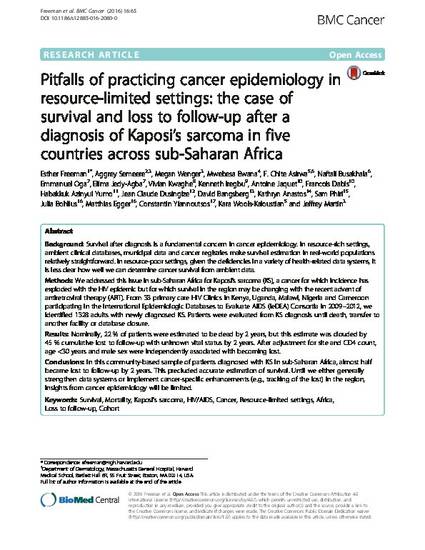
- AIDS (Disease) -- Sub-Saharan Africa -- Treatment,
- Kaposi's sarcoma,
- AIDS (Disease) -- Sub-Saharan -- Africa -- Mortality,
- Cancer -- Epidemiology
Background: Survival after diagnosis is a fundamental concern in cancer epidemiology. In resource-rich settings, ambient clinical databases, municipal data and cancer registries make survival estimation in real-world populations relatively straightforward. In resource-poor settings, given the deficiencies in a variety of health-related data systems, it is less clear how well we can determine cancer survival from ambient data.
Methods: We addressed this issue in sub-Saharan Africa for Kaposi’s sarcoma (KS), a cancer for which incidence has exploded with the HIV epidemic but for which survival in the region may be changing with the recent advent of antiretroviral therapy (ART). From 33 primary care HIV Clinics in Kenya, Uganda, Malawi, Nigeria and Cameroon participating in the International Epidemiologic Databases to Evaluate AIDS (IeDEA) Consortia in 2009–2012, we identified 1328 adults with newly diagnosed KS. Patients were evaluated from KS diagnosis until death, transfer to another facility or database closure.
Results: Nominally, 22 % of patients were estimated to be dead by 2 years, but this estimate was clouded by 45 % cumulative lost to follow-up with unknown vital status by 2 years. After adjustment for site and CD4 count, agelost.
Conclusions: In this community-based sample of patients diagnosed with KS in sub-Saharan Africa, almost half became lost to follow-up by 2 years. This precluded accurate estimation of survival. Until we either generally strengthen data systems or implement cancer-specific enhancements (e.g., tracking of the lost) in the region, insights from cancer epidemiology will be limited.

Originally appeared in BMC Cancer, volume 16, number 65, published by BioMed Central.